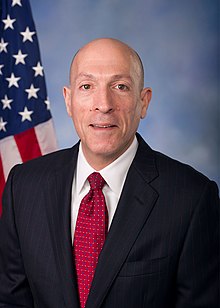House Sergeant at Arms
| Sergeant at Arms of the U.S. House of Representatives | |
|---|---|
| Appointer | Elected by the House |
| Term length | Two years |
| Inaugural holder | Joseph Wheaton |
| Website | Sergeant at Arms |
The Sergeant at Arms of the United States House of Representatives is an officer of the House with law enforcement, , and administrative responsibilities. The Sergeant at Arms is elected at the beginning of each Congress by the membership of the House.
As the chief law enforcement officer of the House, the Sergeant at Arms is responsible for security in the House wing of the United States Capitol, the House office buildings, and on adjacent grounds. Under the direction of the Speaker of the House or other presiding officer, the Sergeant at Arms plays an integral role in maintaining order and decorum in the House chamber.
The Sergeant at Arms is also responsible for ensuring the safety and security of members of Congress, congressional staff, visiting dignitaries, and tourists. Toward this mission, the Sergeant at Arms works in concert with the Senate Sergeant at Arms, and the Architect of the Capitol. These three officials, along with the Chief of the Capitol Police in an ex officio status, comprise the Capitol Police Board.
Through custom and precedent, the Sergeant at Arms performs a number of protocol and ceremonial duties. Among these duties are to lead formal processions at ceremonies such as presidential inaugurations, joint sessions of Congress (such as the State of the Union address, prior to 2007), formal addresses to the Congress, greeting and escorting visiting foreign dignitaries, and to supervise congressional funeral arrangements. In this capacity, the Sergeant at Arms is most famous for announcing the arrival of the President, a responsibility that he took over from the Doorkeeper of the United States House of Representatives when the latter position was abolished in 1995. Custom dictates that he announce the arrival of the Supreme Court, the President's cabinet, and finally the President by saying, "Mister (or Madam) Speaker, the President of the United States!"
...
Wikipedia

